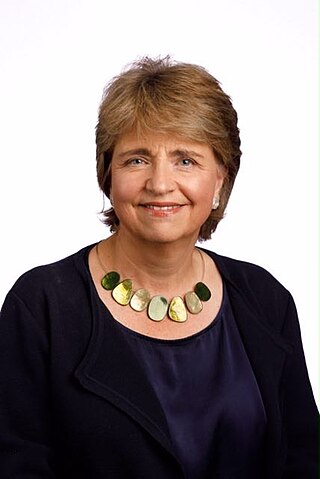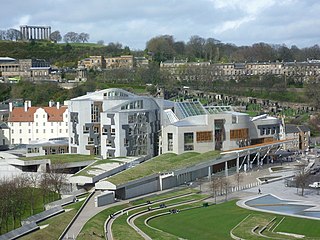
The legislatures of the United Kingdom are derived from a number of different sources. The Parliament of the United Kingdom is the supreme legislative body for the United Kingdom and the British overseas territories with Scotland, Wales and Northern Ireland each having their own devolved legislatures. Each of the three major jurisdictions of the United Kingdom has its own laws and legal system.

The Scottish Parliament is the devolved, unicameral legislature of Scotland. Located in the Holyrood area of the capital city, Edinburgh, it is frequently referred to by the metonym Holyrood. The Parliament is a democratically elected body comprising 129 members known as Members of the Scottish Parliament (MSPs), elected for five-year terms under the regionalised form of additional member system (MMP): 73 MSPs represent individual geographical constituencies elected by the plurality (first-past-the-post) system, while a further 56 are returned as list members from eight additional member regions. Each region elects seven party-list MSPs. Each region elects 15 to 17 MSPs in total. The most recent general election to the Parliament was held on 6 May 2021, with the Scottish National Party winning a plurality.

The Scotland Act 1998 is an Act of the Parliament of the United Kingdom which legislated for the establishment of the devolved Scottish Parliament with tax varying powers and the Scottish Government. It was one of the most significant constitutional pieces of legislation to be passed by the UK Parliament between the passing of the European Communities Act in 1972 and the European Union (Withdrawal) Act in 2018 and is the most significant piece of legislation to affect Scotland since the Acts of Union in 1707 which ratified the Treaty of Union and led to the disbandment of the Parliament of Scotland.

The politics of Scotland operate within the constitution of the United Kingdom, of which Scotland is a country. Scotland is a democracy, being represented in both the Scottish Parliament and the Parliament of the United Kingdom since the Scotland Act 1998. Most executive power is exercised by the Scottish Government, led by the First Minister of Scotland, the head of government in a multi-party system. The judiciary of Scotland, dealing with Scots law, is independent of the legislature and the Scottish Government. Scots law is primarily determined by the Scottish Parliament. The Scottish Government shares some executive powers with the Scotland Office, a British government department led by the Secretary of State for Scotland.

The Scottish Government is the devolved government of Scotland. It was formed in 1999 as the Scottish Executive following the 1997 referendum on Scottish devolution. Amongst its areas for responsibility of decision making and domestic policy in the country include the economy, education system, health care, justice and the legal system, rural affairs, housing, the crown estate, the environment, the fire service, equal opportunities, the transportation network and tax, amongst others.

The first minister of Scotland, formally the First Minister and Keeper of the Scottish Seal, is the head of the Scottish Government and the keeper of the Great Seal of Scotland. The first minister chairs the Scottish Cabinet and is primarily responsible for the formulation, development, and presentation of the Scottish Government's policies. Additional functions of the first minister include promoting and representing Scotland in an official capacity, at home and abroad.

The 2003 Scottish Parliament election was the second election of members to the Scottish Parliament. It was held on 1 May 2003 and it brought no change in terms of control of the Scottish Executive. Jack McConnell, the Labour Party MSP, remained in office as First Minister for a second term and the Executive continued as a Labour and Liberal Democrat coalition. As of 2023, it remains the last Scottish Parliament election victory for the Scottish Labour Party, and the last time the Scottish National Party lost a Holyrood election.

The first election to the devolved Scottish Parliament, to fill 129 seats, took place on 6 May 1999. Following the election, the Labour Party and the Liberal Democrats formed the Scottish Executive, with Labour Member of the Scottish Parliament (MSP) Donald Dewar becoming First Minister.

The Department for Environment, Food and Rural Affairs (Defra) is a ministerial department of the Government of the United Kingdom. It is responsible for environmental protection, food production and standards, agriculture, fisheries and rural communities in the entire United Kingdom. Concordats set out agreed frameworks for co operation, between it and the Scottish Government, Welsh Government and Northern Ireland Executive, which have devolved responsibilities for these matters in their respective nations.

The Office of the Secretary of State for Scotland, often referred to as the Scotland Office, is a department of His Majesty's Government headed by the Secretary of State for Scotland and responsible for Scottish affairs that lie within HM Government's responsibility.

Wendy Alexander is a retired Scottish politician and the former Member of the Scottish Parliament (MSP) for Paisley North. She held various Scottish Government cabinet posts and was the Leader of the Labour Party in Scotland from 2007 to 2008. In 2010–2011 she convened the Scotland Bill Committee on financial powers of the Scottish Parliament.

The Strategic Rail Authority (SRA) was a non-departmental public body in the United Kingdom set up under the Transport Act 2000 to provide strategic direction for the railway industry. Its motto was 'Britain's railway, properly delivered'. It was abolished by the Railways Order 2006, its functions being absorbed by the Department for Transport or the Office of Rail Regulation.

This is a list of members (MSPs) returned to the first Scottish Parliament at the 1999 Scottish Parliament election. Of the 129 members, 73 were elected from first past the post constituencies with a further 56 members being returned from eight regions, each electing seven MSPs as a form of mixed member proportional representation.

Angus MacKay is a Scottish politician who served as Minister for Finance and Local Government from 2000 to 2001. A member of the Scottish Labour Party, he was the Member of the Scottish Parliament (MSP) for the Edinburgh South constituency from 1999 to 2003.

The Scottish Funding Council, formally the Scottish Further and Higher Education Funding Council, is the non-departmental public body charged with funding Scotland's further and higher education institutions, including its 26 colleges and 19 universities.
Historic England is an executive non-departmental public body of the British Government sponsored by the Department for Culture, Media and Sport. It is tasked with protecting the historic environment of England by preserving and listing historic buildings, scheduling ancient monuments, registering historic parks and gardens and by advising central and local government.

Since 1922, the United Kingdom has been made up of four countries: England, Scotland, Wales and Northern Ireland. The UK Prime Minister's website has used the phrase "countries within a country" to describe the United Kingdom. Some statistical summaries, such as those for the twelve NUTS 1 regions of the UK, refer to Northern Ireland, Scotland, and Wales as "regions". With regard to Northern Ireland, Scotland and Wales particularly, the descriptive name one uses "can be controversial, with the choice often revealing one's political preferences".

Devolution is the process in which the central British parliament grants administrative powers to the devolved Scottish Parliament. Prior to the advent of devolution, some had argued for a Scottish Parliament within the United Kingdom – while others have since advocated for complete independence. The people of Scotland first got the opportunity to vote in a referendum on proposals for devolution in 1979 and, although a majority of those voting voted 'Yes', the referendum legislation also required 40% of the electorate to vote 'Yes' for the plans to be enacted and this was not achieved. A second referendum opportunity in 1997, this time on a strong proposal, resulted in an overwhelming 'Yes' victory, leading to the Scotland Act 1998 being passed and the Scottish Parliament being established in 1999.

The following outline is provided as an overview of and topical guide to Scotland:















